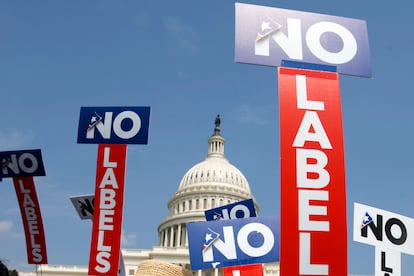No Labels Party says it could offer bipartisan presidential ticket in 2024
The new national political movement said Monday it has now won ballot access in 10 states, with the latest being North Carolina

A national political movement that could offer a bipartisan presidential ticket in 2024 as an alternative to major-party nominees said Monday it has now won ballot access in 10 states, after North Carolina election officials formally granted official status to a “No Labels” affiliate.
The State Board of Elections voted 4-1 on Sunday to recognize the No Labels Party as an official North Carolina party following a successful petition effort. It joins four other recognized parties, with which voters can now choose to be registered and field candidates.
The new North Carolina party is linked to a national No Labels effort that lists a wide array of mostly centrist political leaders backing it. They include former North Carolina GOP Gov. Pat McCrory, U.S. Sen. Joe Manchin, D-W.Va., and former Connecticut Sen. Joe Lieberman, a former Democrat who became an independent.
No Labels is poised to offer a bipartisan ticket for president and vice president if Democrats and Republicans “select unreasonably divisive presidential nominees.” North Carolina, usually considered a battleground state, has 16 electoral votes at stake.
The other states are Alaska, Arizona, Arkansas, Colorado, Florida, Nevada, Oregon, South Dakota and Utah.
Reaching 10 states is “a historic victory for Americans who have said loud and clear they want more choices at the ballot box. The spirit of democracy is winning in America today,” civil rights leader Benjamin Chavis, a North Carolina native and national co-chair of No Labels, said in a news release Monday.
There is no named ticket yet for No Labels. Group leaders have said it would stand down if there’s no clear path to victory next year. But some Democrats are worried that won’t happen, leading unintentionally to the election of Republican Donald Trump. National left-leaning groups have been working to derail the group’s presidential ambitions.
North Carolina state law says that to be recognized, a party must collect signatures from registered voters equal to 0.25% of the total number of voters who voted in the last election of governor in 2020, or just under 13,900 signatures. State election officials agreed that No Labels provided over 14,800 signatures, and also met a requirement that at least 200 signatures each come from three congressional districts.
The other official North Carolina parties are the Democratic, Republican, Green and Libertarian parties. Voters also can register as unaffiliated, which represents the largest bloc in the state.
Board chair Alan Hirsch and member Jeff Carmon, both Democrats, joined Republicans Four Eggers and Kevin Lewis in voting for the official recognition. Democratic member Siobhan O’Duffy Millen voted no.
The official recognition followed questions seeking more information on No Labels, particularly its affiliation with the national movement, and whether it truly met the definition of a party.
The board also was interested in whether the party’s signature collectors properly informed signers of the “general purpose and intent” of the party, as state law requires.
No Labels presented affidavits from collectors stating that they were instructed to share in part it was a party “to bring all the parties together to get things done in Washington through a unity ticket” and that the petition “allows a third party to run candidates in the presidential election.”
But Millen said the evidence wasn’t strong enough and questioned whether the No Labels Party of North Carolina met the party definition.
She pointed to media reports quoting national No Labels leaders saying they wouldn’t field candidates up and down ballots and that operations would end after the November 2024 elections.
“It seems to me that North Carolina law does not adequately address this novel situation” when the goal of a group is to secure a spot in one election instead of becoming an ongoing party, Millen said.
While the national No Labels group is organized under a section of federal tax law in which it now doesn’t have to disclose its donors, the state affiliate would have to follow state campaign finance disclosure rules, as the other recognized parties must do.
Eggers, who made the motion to recognize the No Labels Party, said he shared some of Millen’s concerns. But he said there was no dispute that the party met the numerical signature threshold, and the standard to meet “general purpose and intent” requirement was quite low.
Sign up for our weekly newsletter to get more English-language news coverage from EL PAÍS USA Edition
Tu suscripción se está usando en otro dispositivo
¿Quieres añadir otro usuario a tu suscripción?
Si continúas leyendo en este dispositivo, no se podrá leer en el otro.
FlechaTu suscripción se está usando en otro dispositivo y solo puedes acceder a EL PAÍS desde un dispositivo a la vez.
Si quieres compartir tu cuenta, cambia tu suscripción a la modalidad Premium, así podrás añadir otro usuario. Cada uno accederá con su propia cuenta de email, lo que os permitirá personalizar vuestra experiencia en EL PAÍS.
¿Tienes una suscripción de empresa? Accede aquí para contratar más cuentas.
En el caso de no saber quién está usando tu cuenta, te recomendamos cambiar tu contraseña aquí.
Si decides continuar compartiendo tu cuenta, este mensaje se mostrará en tu dispositivo y en el de la otra persona que está usando tu cuenta de forma indefinida, afectando a tu experiencia de lectura. Puedes consultar aquí los términos y condiciones de la suscripción digital.








































